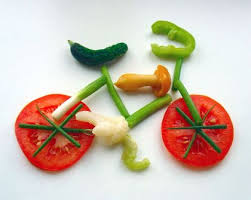Nutrition Is an Inside and an Outside Job
 Food and Nutrition is a hot topic, no matter what your diet. And, it seems, almost everyone considers themselves to be experts on the subject. Just ask anyone if they think they eat well, or tell them that you are considering eating a diet made up solely of raw fruits and vegetables, and see what kind of response you get.
Food and Nutrition is a hot topic, no matter what your diet. And, it seems, almost everyone considers themselves to be experts on the subject. Just ask anyone if they think they eat well, or tell them that you are considering eating a diet made up solely of raw fruits and vegetables, and see what kind of response you get.
Oddly enough, the more attention we put upon the quality of the food we eat, the more concerned about nutrition we become. This is obviously backwards thinking, yet it may be well founded, considering what most people call “nutritious eating.” Focusing extra attention on nutrition typically leads people to (rightly) conclude that the most nutritious foods are raw fruits and vegetables. When you eat the 80/10/10 diet, you can stop worrying about nutrition, as far as food is concerned. Nutrition, however, reaches far beyond food.
We can view the issue of nutrition in a variety of ways. Do we look at the food we eat, or would that be diet and not nutrition? Certainly many dietitians fancy themselves experts in nutrition. Do we look at the way we prepare our food, or would that be culinary skill rather than nutrition? Can you think of many raw food chefs who do not dispense copious nutrition advice along with their culinary wisdom? Do we evaluate our nutrition by analyzing the individual nutrients in our foods, or with almost a million nutrients to consider, and given their complex interactions, is that not an attempt to micromanage a situation so complex as to be completely beyond our comprehension or control? It really is not clear whether we are better off looking at nutrition from the standpoint of food (thus analyzing its nutrients), or from the standpoint of nutrients, (thus determining which foods to choose).
What has become clear to me, however, is that the great majority of factors that critically affect our nutrition have nothing whatever to do with the food we eat.
What are some of these “outside” (nonfood) factors that are so important to our nutrition? Let’s take a brief look at just a few of them.
Sunshine and Daylight
 It is interesting to note that two nutrients making the nutrition headlines these days don’t even come from food-vitamin D and vitamin B12. Yet when we think of nutrition, we invariably think of our food as the primary source. Apparently, at least in the case of vitamin D and vitamin B12, this is not the case. Perhaps it is time to broaden our thinking, and realize that your nutrition, like your overall health, is only as strong as its weakest link. While most of us are more comfortable to simply hear confirmation of what we think we already know, an open mind is required if we truly wish to learn anything new.
It is interesting to note that two nutrients making the nutrition headlines these days don’t even come from food-vitamin D and vitamin B12. Yet when we think of nutrition, we invariably think of our food as the primary source. Apparently, at least in the case of vitamin D and vitamin B12, this is not the case. Perhaps it is time to broaden our thinking, and realize that your nutrition, like your overall health, is only as strong as its weakest link. While most of us are more comfortable to simply hear confirmation of what we think we already know, an open mind is required if we truly wish to learn anything new.
Not only is sunshine directly responsible for almost all of our production of vitamin D, an essential nutrient that affects calcium metabolism in every cell of the body, it is also our sole source of ultraviolet (UV) radiation. UV is known as a sanitizing agent; it disinfects whatever it comes into contact with. Our skin is cleansed of fungi, molds, and many other undesirable microbial life forms when it is exposed to sunlight. The UV rays penetrate the skin for almost an inch, cleaning blood, lymph, intracellular fluids, and extracellular fluids along the way. Without UV exposure, our blood can become so toxic that our kidneys eventually fail to handle the load.
Many organs and glands depend upon sunlight as a regulatory factor. A variety of hormones affecting calcium metabolism, normalized cell growth, sexuality, and many other important functions are dependent upon moderate exposure to sunlight. Don’t fall prey to the false and ubiquitous mythology that regular doses of direct, moderate sunlight causes cancer; it does not. Our nutrition would be critically compromised without such exposure.
Without sunlight, none of the fruits and vegetables that we call food could grow or even survive. In darkness, it would be almost impossible for us to find our food. Sure, we now can create artificial lights, and even artificial sunlight, but no man-made light source provides an acceptable substitute for the real thing.
Daylight is as important to our mental health as it is to our overall nutrition. Sunlight affects our mood, for the better, an issue that I discuss below, under “Emotional Poise.”
Intrinsic Factor
We get redundant exposure to vitamin B12, which is produced by bacteria, on the surfaces of almost all of the garden-fresh organic fruits and vegetables we consume. However, a great many us (including a proportionally equal number of meat eaters) experience deficiencies as a result of a reduced ability to absorb this valuable nutrient. Intrinsic factor, produced by the parietal cells of the stomach, is necessary for the absorption of B12 in the intestines. If you are not producing a sufficient quantity of intrinsic factor, you will eventually become deficient in B12, which is a common cause of B12 deficiency. There are many reasons for producing or absorbing insufficient intrinsic factor. A few of the most common are death of the cells that produce intrinsic factor (sometimes caused by specific antibodies), stomach cancer, ulcers, specific diseases of the small intestine, fish tapeworm, stomach surgery, and bowel surgery.
Physical Activity
When it comes to specific nutrients, the majority of people are concerned with  “getting enough,” rather than actually consuming quantities that are in the recommended range. This is fair enough, since actually hitting those ranges is nearly impossible if one eats a relatively standard western diet, does not eat a sufficient number of calories to maintain weight, or is on a raw diet that is too high in fats.
“getting enough,” rather than actually consuming quantities that are in the recommended range. This is fair enough, since actually hitting those ranges is nearly impossible if one eats a relatively standard western diet, does not eat a sufficient number of calories to maintain weight, or is on a raw diet that is too high in fats.
Let’s compare a hypothetical set of identical twins who eat identical foods. One is completely sedentary, a lover of music and the arts. The other is quite athletic, enjoying triathlon and weight training. The first meets her calorie requirements, and holds her weight, eating 1,800 calories per day. The latter, being more active, does the same by consuming 3,600 calories per day. Obviously, if they are eating the same foods, the athletic twin consumes double the calories, and twice the nutrients, of her sister.
The greater quantity of food makes it far easier for her to get enough of key nutrients, which can be difficult to consume in sufficient quantities. When it comes to excellent nutrition, being physically active is an essential ingredient. Not only do we eat more food when we are active, compared to when we are sedentary, but physical activity also enhances our digestion, and our ability to uptake and utilize the nutrients we consume. And the nutritional benefits of being fit do not end there. Muscles use more fuel than most other tissues, even when they are at rest. This means that a well-muscled person will require more fuel than an equally active but under-muscled person, hence taking in more nutrients of all types.
Fresh Air
 Ever heard of anti-vitamins and anti-nutrients? The concepts have been taught in nutrition school for 50 years and longer. We know, for instance, that carbon monoxide in the air effectively competes for space with oxygen on our red blood cells. The carbon monoxide functions as an anti-nutrient. Strontium 90, an aggressive carcinogen, is present worldwide in our air from radioactive fallout, a result of nuclear explosions. Strontium 90 is an anti-nutrient that successfully competes with calcium in our bones, and elsewhere in the human body. Milk from cows as well as human mother’s milk has been shown to contain levels of strontium 90 that are far beyond those considered safe. As another example, factors in cigarette smoke cause us to blow through our vitamin C at an amazingly high rate. Besides being a carcinogen, cigarette smoke functions, in part, as an anti-vitamin. A whole host of such anti-vitamins and anti-nutrients exist in the air we breathe. Powerful airborne carcinogens in deep-fry oil are part of the reason that cooking with trans fats has been outlawed in many parts of the world.
Ever heard of anti-vitamins and anti-nutrients? The concepts have been taught in nutrition school for 50 years and longer. We know, for instance, that carbon monoxide in the air effectively competes for space with oxygen on our red blood cells. The carbon monoxide functions as an anti-nutrient. Strontium 90, an aggressive carcinogen, is present worldwide in our air from radioactive fallout, a result of nuclear explosions. Strontium 90 is an anti-nutrient that successfully competes with calcium in our bones, and elsewhere in the human body. Milk from cows as well as human mother’s milk has been shown to contain levels of strontium 90 that are far beyond those considered safe. As another example, factors in cigarette smoke cause us to blow through our vitamin C at an amazingly high rate. Besides being a carcinogen, cigarette smoke functions, in part, as an anti-vitamin. A whole host of such anti-vitamins and anti-nutrients exist in the air we breathe. Powerful airborne carcinogens in deep-fry oil are part of the reason that cooking with trans fats has been outlawed in many parts of the world.
Without an abundant supply of clean fresh air, the chances for optimum nutrition are reduced to almost zero. Oxygen, considered by some to be a nutrient in its own right, is present in fresh air at about 20%. In city air, oxygen levels tend to range from about 18 to 15%, and in highly polluted areas it can drop to 13% or less. The expression “a breath of fresh air” has never been more accurate than when referring to fresh air itself.
Emotional Poise
You sit down to a lovely dinner meal with your beloved. A warm atmosphere pervades. You and your loved one enjoy your first few bites. Then the bomb drops, the argument starts, the atmosphere shatters, and everyone is upset. Your insides begin to feel as if they have been tied in knots, and your food feels like a rock in your stomach. “I can’t eat now; “I’m too upset,” you say.
 Ever try to eat a calm meal with people getting up and down from the table, several conversations going on, people leaving and entering the room, and other frantic activity going on all around you? It is highly stressful, if even possible. There is a reason the B vitamins are known as the “stress” vitamins. When you are worried, fearful, in doubt, under pressure, or in any way stressed, you use up B vitamins at an immensely accelerated pace compared to the norm. Virtually all of your bodily chemistry is affected by your thoughts.
Ever try to eat a calm meal with people getting up and down from the table, several conversations going on, people leaving and entering the room, and other frantic activity going on all around you? It is highly stressful, if even possible. There is a reason the B vitamins are known as the “stress” vitamins. When you are worried, fearful, in doubt, under pressure, or in any way stressed, you use up B vitamins at an immensely accelerated pace compared to the norm. Virtually all of your bodily chemistry is affected by your thoughts.
When you are lacking in emotional poise, your digestion and your nutrition are (not insignificantly) compromised.
Water
“Don’t drink the water” used to be a very popular phrase for tourists visiting third-world and emerging nations. A variety of microbes in the water led to various rather severe versions of indigestion, malabsorption, and diarrhea. Some were even life threatening. The water we drink, or don’t drink, is critical to our nutrition.
 When we are dehydrated, the dehydration extends to every cell of the body, critically affecting cellular nutrient uptake and toxin elimination. Over-hydrated, we run the risk of diluting our blood to the point that the electrolytes therein cease to do their job effectively. Keeping properly hydrated (typically indicated by urinating almost clear urine of satisfactory volume eight to twelve times in every 24-hour period) is essential to maintaining healthy nutrition. Distillation or reverse osmosis provide the best water available. Water that is rich in inorganic minerals will tend to lead to the development of kidney stones, hardening of the arteries, and other sclerotic conditions.
When we are dehydrated, the dehydration extends to every cell of the body, critically affecting cellular nutrient uptake and toxin elimination. Over-hydrated, we run the risk of diluting our blood to the point that the electrolytes therein cease to do their job effectively. Keeping properly hydrated (typically indicated by urinating almost clear urine of satisfactory volume eight to twelve times in every 24-hour period) is essential to maintaining healthy nutrition. Distillation or reverse osmosis provide the best water available. Water that is rich in inorganic minerals will tend to lead to the development of kidney stones, hardening of the arteries, and other sclerotic conditions.
On top of all this, water is used to cool nuclear reactors. The runoff water is high in strontium 89 and strontium 90. These radioactive substances affect all those that live nearby, (levels are higher closer to the reactor, but even 40 miles from a reactor there is still evidence of strontium 90) with children being the most susceptible. Strontium levels in the teeth of children with cancer is almost twice as high as levels in other children.
Sleep
 When sleep quality is compromised, such as by not being able to achieve deep levels of sleep for any reason, hormones and mood are adversely affected. Insufficient sleep leads to lack of energy, reduced physical activities, and lowered overall nutriment intake and absorption. Most people spend a large part of their life sleep deprived. They rely upon alarm clocks, coffee, refined sugar, spicy foods, and other stimulants to have enough energy to get through the day. Each use of stimulants drains the adrenals, and increases the loss of a wide number of nutrients. The more tired you become, the less efficient your digestive system gets. It seems that one of the best things you can do for your nutrition is get a good night’s sleep, every night.
When sleep quality is compromised, such as by not being able to achieve deep levels of sleep for any reason, hormones and mood are adversely affected. Insufficient sleep leads to lack of energy, reduced physical activities, and lowered overall nutriment intake and absorption. Most people spend a large part of their life sleep deprived. They rely upon alarm clocks, coffee, refined sugar, spicy foods, and other stimulants to have enough energy to get through the day. Each use of stimulants drains the adrenals, and increases the loss of a wide number of nutrients. The more tired you become, the less efficient your digestive system gets. It seems that one of the best things you can do for your nutrition is get a good night’s sleep, every night.
Digestion and Absorption
The familiar saying “you are what you eat” seems straightforward and true enough, until you examine it a bit more deeply. Of course, in reality, you are what you absorb and do not eliminate.
The condition known as malabsorption syndrome (MAS) causes one or many of the various nutrients that we consume to be improperly absorbed by the intestines. There are literally dozens of potential causes of MAS, ranging from, but not limited to enzyme production failure, congenital defects, disease of any of the digestive organs, injury, infection, surgery, radiation “therapy,” and even the use of antibiotics. The list of symptoms is equally as long, with some of the most common being anemia, diarrhea, edema, muscle cramping, muscle wasting, and perhaps most important, malnutrition. Various vitamin deficiencies can occur with MAS, accompanied by their specific associated symptoms. Mineral deficiencies can also occur due to MAS, resulting in any number of symptoms ranging from muscle cramps to heart failure. Indeed, absorption of our food is perhaps taken for granted, but is in every way as important to our nutrition as the food we eat.
The better your digestion, the more of the nutrients in food you stand to absorb and utilize. So many factors affect digestion that this article could not begin to list them all. It is enough to say that without good digestion, good nutrition is essentially impossible to achieve.
Food combinations
 Let’s say that your digestive system is working perfectly, and you have done your homework and know how to make good food choices. You treat yourself lovingly with your food, and always pick the highest quality of fruits and vegetables available. Still, you suffer from indigestion, foul gas, and troublesome eliminations. The problem could be that you are not combining your food properly so as to foster optimum digestion.
Let’s say that your digestive system is working perfectly, and you have done your homework and know how to make good food choices. You treat yourself lovingly with your food, and always pick the highest quality of fruits and vegetables available. Still, you suffer from indigestion, foul gas, and troublesome eliminations. The problem could be that you are not combining your food properly so as to foster optimum digestion.
A simple awareness of which food types tend to digest best together can go a long way toward enhancing digestion. The better you digest your food, the more the nutrients in that food become available to you.
Starchy foods, should you choose to eat them, digest best with greens and other raw vegetables. Fatty foods also digest best with greens and vegetables. Fruits digest best with other fruits of relatively similar water content. Fruit also digests well with lettuce or celery. Acidic fruit, such as citrus or pineapple, digests well with raw vegetables, and even with most fatty foods.
Keeping the total number of ingredients in a meal as low as possible is always good for digestion. Variety over the course of the year is good for nutrition, but simplicity at each meal is also essential for nutrition, as it offers optimum opportunity for digestion. The model for optimum digestion demonstrated by animals in the wild is to eat “one food at a time, when hungry, until full.” This practice will maximize your nutrition, and surprisingly enough, your enjoyment of the food you eat.
Biological Transmutation
Biological transmutation, is performed by the body all the time. For example, we convert one amino acid into another, or one form of fat into another, or sugars into different forms of sugars. We produce sugars from fats and proteins and even manufacture fats from proteins and sugars. We create enzymes, co-enzymes, and a host of other substances from the raw materials we consume. We even recycle the materials released into the blood from cellular degeneration, converting the debris into whatever structures are needed. Indeed, if it weren’t for biological transmutation, our bodies would never be able to be well-nourished or even to maintain homeostasis.
Good nutrition is invariably the result of healthful living. Nothing else will get you there. Sure, food plays a role in your nutrition, but it is your lifestyle that is critical. Healthful living results in health, and all factors of health are interrelated, and interdependent. Anything other than healthful living results in symptoms. Should you have symptoms, of any kind, you may want to consider correcting their lifestyle cause(s), rather than treating them.
